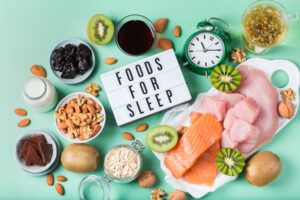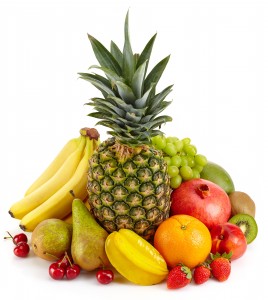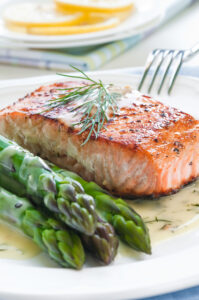
Which foods help you sleep better? The Nutrition Breakthroughs Blog has provided several articles on the best sleep inducing foods, and those that follow below are the top five most popular articles of all time.
1. Sleep Foods Chart: The Top Proven Foods for Insomnia
This article features a chart that summarizes research studies on foods that are high in the natural sleep hormone known as melatonin. What foods are high in melatonin? Find out more about walnuts, cherries, almonds and more. Also included in this article are good sources of potassium, calcium and magnesium – all proven to help remedy insomnia.
2. Melatonin Rich Fruits for Sleep: Studies from Nutrition Breakthroughs 
Melatonin levels start rising in the evening and go up to a peak level in the early hours of the morning, perhaps around 2:00 or 3:00 a.m, and then they reduce.
This may partially explain why some people can sleep fine for a few hours and then suddenly find themselves wide awake and unable to go back to sleep.
Do bananas help you sleep? Learn more about the research study that shows how tropical fruits such as bananas and pineapples increase melatonin in the body. It was published in the Journal of Agriculture and Food Chemistry.
3. Insomnia Remedies: The Best and Worst Foods for Promoting Sleep
What foods are sleep inducing? This article includes an informative, short chart that contains the five best foods and five worst foods for promoting sleep.
Some foods can act as natural sleep aids, while others can make your time in bed a struggle with tossing and turning all night.
 4. Food for Sleep: Study Says Salmon Remedies Insomnia
4. Food for Sleep: Study Says Salmon Remedies Insomnia
Researchers in Norway have proven that eating fish has a positive impact on good sleep and overall daily functioning.
5. Insomnia Remedies: The Science Behind Sleep Inducing Foods
This article focuses on articles from research journals that have studied which foods are best for inducing sleep, and it also has some doctor recommendations on good bedtime snacks.
This collection of natural health articles on sleep helping foods is brought to you by Nutrition Breakthroughs, a publisher of nutrition articles and supplier of effective natural remedies since 2001.
Nutrition breakthroughs makes Sleep Minerals II, the effective natural sleep aid with calcium, magnesium, zinc, and vitamin D, and also Joints and More, the natural solution for joint relief, aches and pains, stronger hair and nails and more energy.
Studies have shown that certain foods are high in melatonin and magnesium and can help with a better night’s sleep. These include bananas, almonds, walnuts and tart cherries or their juice. Magnesium rich foods include yogurt, avocado, figs, nut butter, pumpkin seeds and sunflower seeds.
Learn more about walnuts, tart cherries, almonds, bananas and more. Also included in this article are good food sources of potassium, calcium and magnesium – all proven to help remedy insomnia.
Bananas are very high in potassium and a deficiency of potassium can interfere with restful sleep. Eating a banana before bedtime may help reduce nighttime awakenings and provide a better, deeper night’s sleep. Potassium is found abundantly in fresh vegetables and fruits, so these are a good focus as opposed to eating a lot of processed or packaged foods containing high salt.
Studies have shown that the following foods and beverages are sleep inducing: Bananas, tart cherries, tart cherry juice, almonds, walnuts, yogurt, salmon, pumpkin seeds, pineapple, nut butter, turkey, kiwi fruit and warm milk. Soothing teas shown to help sleep include chamomile, lavender, lemon balm and passionflower.



